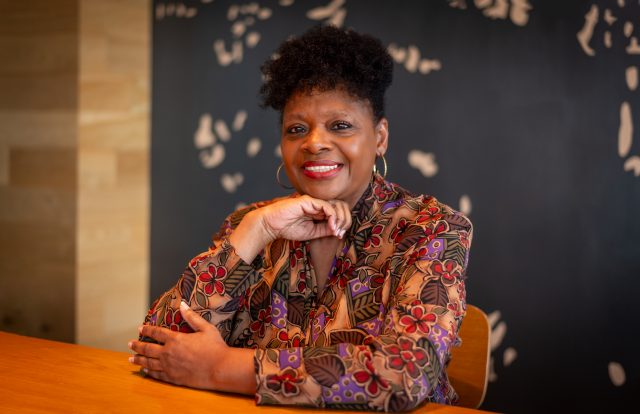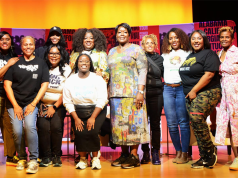
By Nicole S. Daniel
The Birmingham Times
Few are as excited for Birmingham to host its first ever National Association of Black Journalists (NABJ) Convention and Career Fair as multimedia journalist Phyllis Gilchrist, a co-founder of the Birmingham Association of Black Journalists (BABJ) more than 40 years ago, the Magic City’s first group of African American media professionals.
Gilchrist was so thrilled, in fact, that she was at the Birmingham-Shuttlesworth International Airport (BHM) at 7 a.m. on the first full day of the gathering with welcome signs to greet some of more-than-4,000 journalists expected to convene from August 2–6.
She was at BHM not only because the city is her hometown but also because she wants “to help make Birmingham and its media [individuals and organizations] look good, so journalists will want to return to the Magic City after the convention,” Gilchrist said during a recent interview with The Birmingham Times.
The veteran media professional, who has been in the business for more than four decades, offers these words of encouragement to convention attendees: “Look for opportunities for professional development. Network and meet people in the industry who have their fingers on the pulse [and] are the lifeblood of what it is that we do, which is communication. Look for trends in media. Become the best journalist you can be.”
Gilchrist added that there is always more to learn. “Things change every day—by the decade, by the generation, year by year, sometimes month by month, with technology and methods of delivery,” she said.
Throughout her career, her jobs and stops have been extensive, including stints as a news anchor, reporter, producer, assistant city editor, managing editor, and senior editor in states like Alabama, Florida, and Missouri, and in cities like Chicago, Illinois, Boston, Massachusetts, and Washington, D.C. Now, she’s preparing for a podcast centered on politics “flavored with some Southern seasoning,” she said.
Gilchrist, who earned her master’s degree in digital journalism from Georgetown University in 2017 at age 63, has amassed a broad range of contacts and sources in government, politics, and media, and she believes they need a voice in a conversational tone from a “uniquely female-in-media point of view.”
That’s another reason the NABJ convention is important for her: Gilchrist plans to sit in on panel discussions geared toward podcasting, so she can listen for tips on how to make her launch a success.
The Influence of Media
Growing up on the west side of Birmingham, Gilchrist has always had a strong interest in politics.
“I was born in 1954, the year of Brown v. Board of Education, [the Supreme Court case that legally ended decades of racial segregation in America’s public schools],” she said.
There were several other key Civil Rights events during the first 10 years of her life as well that included President John F. Kennedy, a champion of Civil Rights, being elected in 1960 [he was assassinated in Dallas, Texas, in 1963; Civil Rights activist Medgar Evers killed in the driveway of his Jackson, Mississippi, home in 1963; Birmingham’s 16th Street Baptist Church being bombed, killing four little Black girls in 1963 and the Children’s Marches, during which more than 5,000 school students helped end segregation in the city. In 1964, there were the Freedom Summer murders, when [Civil Rights workers] James Chaney, Michael Schwerner, and Andrew Goodman were tortured and murdered by the Ku Klux Klan in Mississippi.
It was amid these turbulent times that Gilchrist was raised along with her eight other siblings; she was the sixth child. The youngsters were raised by their mother, Irene Gilchrist-Holmes, who was a young widow at the time and remarried after all of her children became adults.
Of her mother, who she considers her role model, Gilchrist said, “She had to be the mother and the father for the years of our development.”
Gilchrist’s mother, who passed away in 2011, exposed her daughter to journalism.
“I am a true child of the TV generation. My mother always had a newspaper in that house—The Birmingham News, Ebony and Jet magazines. There was always something to read and see,” said Gilchrist, adding that she and her siblings had to read newspapers out loud to their mother while she washed the dishes.
“We started with reading the horoscopes because she wanted to see what her horoscope was for the day. Then we would go to the funny papers and then the news,” she said.
When she was 6 years old, Gilchrist remembered seeing “[President] Kennedy being sworn in. Watching that on TV is one of my earliest childhood memories.”
In their household, televisions often kept the children occupied, she added: “So, media from the beginning has always been important. I was always comfortable with radio, television, newspapers. I didn’t grow up saying I wanted to be a journalist, I was just exposed to it.”
Education was important to Gilchrist’s mother, and “she wanted education to be important to us,” said Gilchrist, who graduated from Western Olin High School, now known as Jackson Olin High School, in 1973 and enrolled at Manchester University, a private liberal arts institution in New Manchester, Indiana.
She started college with the goal of becoming a medical technician, but she eventually decided to focus on communications and, during her senior year, was awarded a “Best Newscast” silver cup. She graduated with a bachelor’s degree in speech and communications in 1978.
“I was lucky enough to get my first job … at a radio station in Fort Wayne, Indiana, where I’d done an internship six months before,” said Gilchrist. For several years, the young media professional worked at different media organizations to learn new skills.
Birth of the BABJ
One of Gilchrist’s stops was in her hometown, where she and other media professionals created the Birmingham Media Association.
“As we became a chapter of the NABJ, we changed the name to the BABJ,” she said. “We wanted to be as inclusive as possible, so everybody that was involved in any level of communications was welcomed.”
After working about 15 years in media, including at The Birmingham News as an assistant city editor, Gilchrist got the opportunity to teach at the University of Missouri, a position she held for about three years. As she continued to grow and gather experience, many thought she was unable to hold a job because she would always leave one job and go to the next.
“There’s a difference between not being able to hold a job — as in you get let go all the time — and seeing an opportunity somewhere else and taking advantage of that opportunity,” Gilchrist said. “You take that opportunity to move on, so you can move up. When I was doing multimedia journalism back in the day, you couldn’t move up in the ranks unless you moved out. … People used to look at me crazy all the time because I would be switching between radio, television, print media, wire services, teaching in the classroom and at major universities, and then going back into the fray.”
Gilchrist saw it as being well-rounded. “So many entry-level and mid-career positions require multimedia skills,” she said. “A lot of organizations are scaling back, … [so] it’s not an option, it’s a requirement to have multimedia skills. When you have the opportunity, you should teach yourself or do what you need to do to get these multimedia skills.”
For Black women who want to stand out in the journalism industry, Gilchrist advises, “Be the best across the board, no matter what your race is, and remember that sexism, gender bias, racism, and classism still exist, so don’t be shocked by it. Always be aware of the fact that [those things] exist and can raise their head at any time or stage of your career. Always be prepared.”
Gilchrist added, “I’m so empowered by the fact that in 2023 so many young ladies are trying to find their individuality and express themselves while being professionals at the same time.”
Read about Nathan Turner Jr., the University of Alabama’s first Black undergrad in journalism. Click here.
Veteran journalist William Singleton researched Black journalists and mental health for his doctoral dissertation. For more click here.
The 2023 National Association of Black Journalists (NABJ) Convention and Career Fair takes place in Birmingham, Alabama, from August 2–6. Thousands of Black journalists from across the United States will be in attendance.




